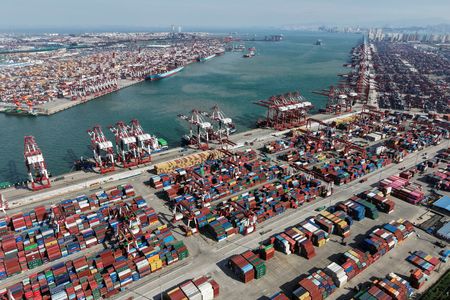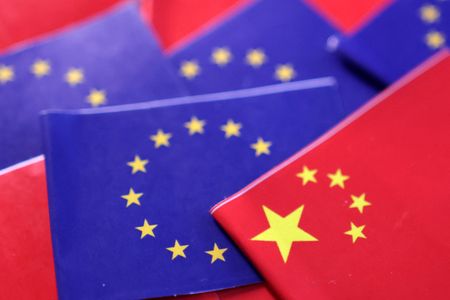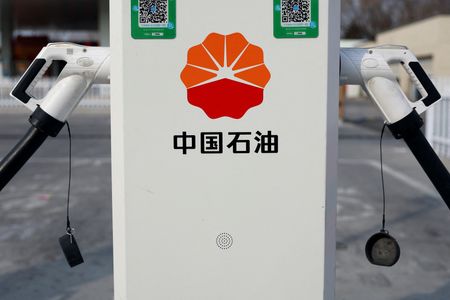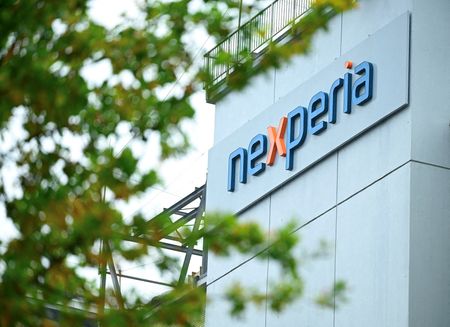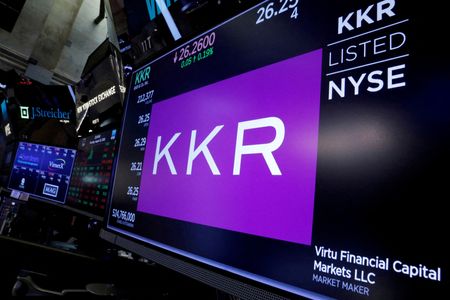By Liz Lee and Shi Bu
BEIJING (Reuters) -U.S. President Donald Trump has targeted top economic rival China with a cascade of tariffs on imports worth billions of dollars as he tries to narrow a trade deficit, bring home lost manufacturing and cripple the fentanyl trade.
Here are key events this year in the U.S.-China trade war, in reverse chronological order:
November 5 – Beijing suspends retaliatory tariffs on U.S. imports from November 10, including farm goods duties of up to 15%, but keeps levies of 10% countering Trump’s “Liberation Day” tariffs.
Imports of U.S. soybeans still face a tariff of 13%, but China will drop curbs on some U.S. optical fibre imports, and ease measures on U.S. entities.
October 30 – United States and China strike new trade truce after talks in South Korea between Trump and Chinese President Xi Jinping. Trump agrees to trim tariffs in exchange for Beijing cracking down on illicit fentanyl trade, resuming U.S. soybean purchases and pausing controls on exports of rare earths.
Beijing says United States also pledged a year’s delay in plan to bar Chinese firms from its technology.
October 25-26 – Malaysia talks yield trade deal framework for both nations’ leaders to decide on after Treasury Secretary Scott Bessent and Trade Representative Jamieson Greer meet Chinese Vice Premier He Lifeng and top trade negotiator Li Chenggang.
October 17 – U.S. State Department calls Chinese sanctions on South Korean shipbuilder Hanwha Ocean “coercion”, undermining ties between Washington and Seoul.
October 15-16 – Greer and Bessent chide China’s expanded rare earth export controls as threat to global supply chains. Bessent vows to seek tighter control of strategic sectors to counter China.
Apple CEO Tim Cook pledges China investment boost.
October 14 – Both nations begin collecting additional port fees from each others’ vessels, but China exempts ships it built. It sanctions five U.S.-linked units of Hanwha Ocean as threats to its security and sovereignty.
October 12-13 – China calls new U.S. tariffs hypocritical, but Bessent says plans for Trump-Xi meet remain on track.
October 10 – Trump unveils additional levies of 100% on imports from China, and new export controls on “any and all critical software”, from November 1, while threatening export controls on Boeing plane parts in response to China’s limits on rare earth exports.
There is no reason to meet Xi, Trump says, but does not cancel plans.
China launches antitrust investigation of U.S. chip maker Qualcomm over puchase of Israeli chip designer Autotalks.
China targets U.S.-linked vessels with port fees from October 14, in response to similar U.S. fees on China-linked ships.
October 9 – China widens export controls on rare earths from November 8, to cover five more medium to heavy elements and beefs up scrutiny of semiconductor users, tightening its grip and dominance on critical minerals.
United States plans to ban Chinese airlines from flying over Russia on U.S. routes, as being disadvantageous to U.S. carriers.
October 1 – Soybeans will be major topic for Xi meet, Trump says, calling China’s sharply reduced U.S. purchases of the oilseed a negotiation tactic.
September 30 – Greer says tariffs of about 55% on Chinese imports are a “good” status quo, but the United States would like freer trade increase.
September 24 – Bessent says chemicals, aircraft engines and parts offer key U.S. leverage in China talks.
September 21 – Visiting U.S. lawmakers tell Premier Li Qiang that China, United States need to step up engagement.
September 19 – Trump and Xi hold telephone call, during which Trump says they made progress on a TikTok pact and agreed to meet face-to-face to discuss trade, illicit drugs and Ukraine war. China welcomes commercial talks on TikTok.
September 17 – China says it will review TikTok’s technology exports and intellectual property licensing.
September 15 – Both sides clinch framework deal to switch TikTok to U.S.-controlled ownership as U.S. vows to refrain from more tariffs on Chinese goods over Russian oil imports unless European levies come first.
September 14 – Fourth round of talks, in Madrid, led by Bessent and China’s He discuss trade and TikTok divestiture deadline of September 17.
August 11 – Both nations extend tariff truce for further 90 days.
August 10 – With trade truce set to expire on August 12, Trump urges China to quadruple U.S. soybean purchases.
August 8 – United States reverses April ban to start issuing Nvidia licences for exports of advanced AI H20 chips to China, as part of talks on rare earths.
July 28-29 – U.S. and Chinese officials agree to seek extension of 90-day tariff truce after two days of talks in Stockholm they call constructive, though they bring no major breakthroughs.
June 27 – Bessent says both sides resolve issues on rare earth minerals and magnets destined for the United States.
June 9-12 – Framework deal reached in London round of talks, while some Chinese rare earths magnet producers begin to receive export licences. Trump says a trade truce is back on track.
June 5 – Xi and Trump hold an hour-long telephone call.
May 31 – Trump says China violated Geneva deal to mutually roll back tariffs and ease curbs on critical minerals exports, but China rejects this, accusing the United States of “discriminatory restrictive” curbs instead.
May 28-29 – United States vows to start “aggressively” revoking visas of Chinese students, while ordering some companies to stop shipping some goods to China.
May 10-12 – First round of trade talks in Geneva agrees to 90-day pause on tariffs, cutting to 30% U.S. tariffs on Chinese goods from 145%, while China drops tariffs to 10% from 125%. China to also scrap non-tariff measures adopted since April 2.
April 15 – Chipmaker Nvidia says U.S. officials told it China sales of the H20 chip would need an export licence.
April 11 – China also raises levies to 125% on U.S. imports, calls Trump’s tariff strategy “a joke” and signals it will ignore any further U.S. “numbers game with tariffs”.
April 10 – China threatens immediate curbs on imports of Hollywood films.
April 9 – China matches levies at 84% on U.S. imports, hits 12 U.S. companies with controls barring exports of dual-use items, and designates six more as “unreliable entities”.
The United States further hikes tariffs to 125% on Chinese imports, from 84%. China warns citizens against U.S. travel.
April 8 – United States raises tariffs to 84% on all Chinese imports, from 34%.
April 4 – China sets retaliatory tariffs of 34% for all U.S. imports from April 10 and export curbs on some rare earths, as well as limits on about 30 U.S. bodies in defence-related fields.
April 2 – Trump unveils sweeping “Liberation Day” tariffs of a baseline 10% on all imports and even higher duties on goods from some countries, with a levy of 34% on China, from April 9.
The United States scraps duty-free access from May 2 for low-value shipments from China and Hong Kong.
March 4 – China hits back with retaliatory levies of 10% to 15% on U.S. agriculture, hitting $21 billion in exports, clamping export and investment curbs on 25 U.S. firms, as well as a ban targeting medical equipment maker Illumina.
March 3 – The United States doubles to 20% fentanyl-related tariffs on all Chinese imports from March 4.
February 4 – China responds with measures targeting U.S. businesses, as well as 15% levies on U.S. coal and LNG and 10% for crude oil and some autos from February 10.
It curbs exports of five metals key to defence and clean energy.
February 1 – Trump imposes 10% punitive duty on goods from China along with 25% on Mexico and Canada, to press for curbs on fentanyl and illegal immigrants flowing into the United States.
(Reporting by Liz Lee and Shi Bu; Editing by Jacqueline Wong, Ronojoy Mazumdar and Kate Mayberry)

